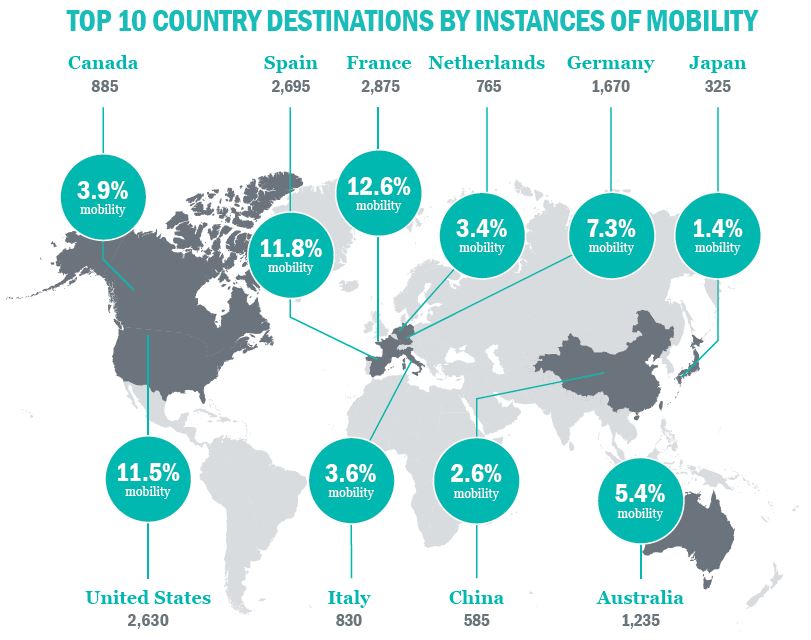
US gains more foreign students amid competitor locations' policy shifts.
US gains more significant share of international student interest amid policy changes in competitor destinations
Short on time? Here are the highlights:
-
Learn about Competitor locations' policies and its shift. The latest edition of Global Emerging Futures research finds that the US is now the most preferred study destination for international students, just ahead of Australia
-
Canada is now the fourth most preferred destination after having been the first in previous surveys
-
Prospective students research destinations’ job markets before they apply and are significantly influenced by career prospects when deciding where to apply
-
More than half of students are aware of policies in destination countries that affect them, and many will change destinations if these policies are perceived as unwelcoming

For the first time since the Emerging Futures surveys were conducted, The US has exceeded Australia and the UK by being the foremost destination choice for responses among international students—far ahead of Canada.
The US is now overwhelmingly ahead of all competitors in recording the most first-time students.
The International Students Global Survey started in March 2022 and is now in its fifth round within 49 countries.
The survey informs about people’s plans (those already planned and others who applied) for Spring 2024: more than 11,500 people filled out answers in March 2024.
To cultivate a global perspective and cross-cultural competency, the organization recruits, hires, and has prospective students who have submitted their study applications and current students from 117 countries as members.
Research revealed that many (54%) prospective and applied students know that some (41%) prospective students are rethinking their plans to excel abroad because of the policies implemented in those countries.
Over a third of students claim that government policy updates have a bi or /very high impact on their choices of study abroad.
Although the US has as thorough immigration procedures as well in particular international students as the EU, the last quarter of 2023 witnessed a soar in the number of visa applications DC rejected; the destination’s “Big Four” still don’t experience as much media uproar as the other three does now.
It keeps categories of quality education (the main strength) and safety (the major weakness) steady among its prime rivals.
Canada’s brand has been critically criticized because of its latest policies.
As a result, Canada dropped from first place (tied with Australia) to the fourth position within the list of preferred destinations for international students, and this happened along with new requirements - a 2-year cap for issuing new study permits and new rules which affect international students more.
The Canadian government has eliminated the work rights for partners of international students (non-graduate level), which is on par with a UK decision to do the same this year.
The graph below shows a six-point drop in the share of the surveyed population choosing Canada as the most favourable country for citizenship since August 2023. In contrast, its value was less than eight points before the surveys were conducted.
However, states like the US have recorded five points compared to the previous year.

"The increasing share given to the US and the New World points to the fact that the students still dream strongly of studying abroad but are, to some extent, concerned about the policy changes in the UK, Australia and Canada.
The effects demonstrate the importance of governments in these countries in offering clarity in international student policies to hold their competitive advantage in the global study industry."
The post-study work route is being reviewed to" Reduce opportunities for abuse.” Nevertheless, the UK maintained the lead, and the positions have not changed much, as the research described in 2030 and 2032.
Nevertheless, business schools in the UK have described the situation as coming short at the non-EU intake level, particularly at the postgraduate portion.
Australia is in third place, falling from its previous number-one spot (tied with Canada) and losing two percentage points since August 2023.
Its reputation among international students is jeopardised as visa rejections have risen dramatically amidst tighter immigration settings, including a rigorous new “Genuine Student Test”.
US is benefitting from students rethinking previously preferred destinations
The US education brand is stable, despite the upheaval and confusion surrounding immigration settings in Australia, Canada, and the UK.
Those competitor countries had prioritised a welcoming policy stance towards international students in 2023 and then abruptly reversed direction as migration levels climbed.
The supply of affordable housing declined, and media outlets seized on stories of students, agents, or institutions taking advantage of the immigration system.
Thus, the US has not had to introduce a new source of competitive advantage to gain a share of prospective student interest— it has only had to maintain the policies it already has in place.
The US claims the highest share of students reconsidering where they will study (20%). Still, New Zealand, Ireland, and Germany are also attracting positive attention, as shown in the chart below.
One in five prospective students rethinking where they will study abroad are setting their sights on the US.

The chances of getting employed/immigrating have a significant role to play in choosing a preferred destination
Student opinions surrounding admission decisions. The most significant impact was applying programs relevant to the “subject of interest.”
Still, on average, all respondents in response to the “Graduation Job Prospects” question chose this program not by relevance but by “Profession Perspective after Graduation Status. ”
The most significant percentages in this ranking are in the Chinese (55%) and Philippine markets (57%).
Moreover, immigrant researchers say that students (especially Bangladeshis and Filipinos) will be very struck by whether there is demand for jobs in a target country—much more than by labour skills shortages in their nation.
“This displays that the students are not only considering what opportunities await them upon graduation, but they are starting their search for what opportunities are available before they even begin their international study program.
This also suggests the need for clarity on international student policies, such as a post-graduate option, to compete in a global market."
The visibly higher than average proportions of Bangladeshi and Filipino students’ desire to work in a host country best unfold that there are destination countries where the demand is more closely tied to immigration policies affecting a student’s ability to work while or after studying.
Students’ top priority is “subject area of interest,” while Chinese students are notably motivated by earning potential after graduation and the availability of internships.
Filipino and Bangladeshi students are interested in work and immigration opportunities, as shown in their keen interest in the “demand for jobs in the destination country. ”
For additional background, please see:
Discover the Latest Updates on Australia’s 485 Graduate Visa Changes
Let us help you yield your true academic potential for foreign education. To configure and discover an apt international enrolment strategy, get in touch!
- +923041111444
- info@edify.pk
- Edify Building, 3rd Floor, Madina Town Faisalabad
© 2026 Edify Group of Companies. All Rights Reserved.







